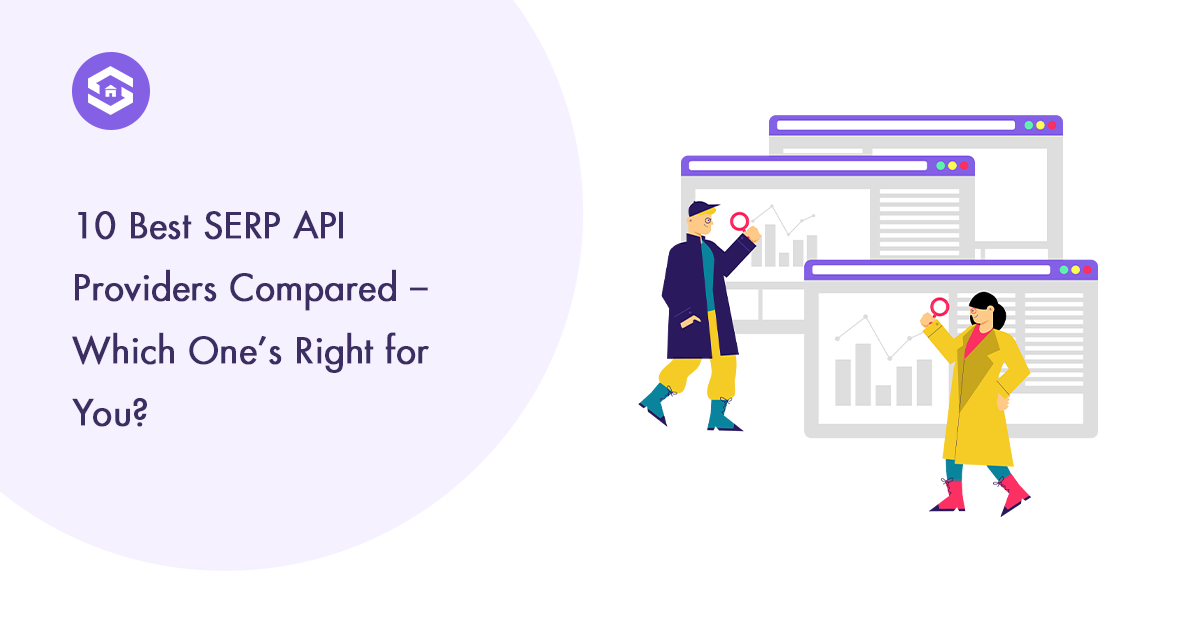
Ever feel like you’re doing everything right with SEO but still don’t know where your website ranks? You are definitely not alone. In today’s digital age, rank tracking is more than just useful; it is mission-critical. That’s why smart marketers and developers are turning to the Best SERP API providers for real-time, dependable insights directly from search engines like Google.
This blog highlights the top 10 best SERP API providers you should know about in 2025. These tools aren’t just popular — they’re practical, powerful, and built to handle everything from keyword monitoring to local SEO tracking. Whether you’re running client campaigns or managing your own brand, these APIs are here to take the guesswork out of search engine data.
Explore the Best SERP API Providers for Smarter SEO in 2025
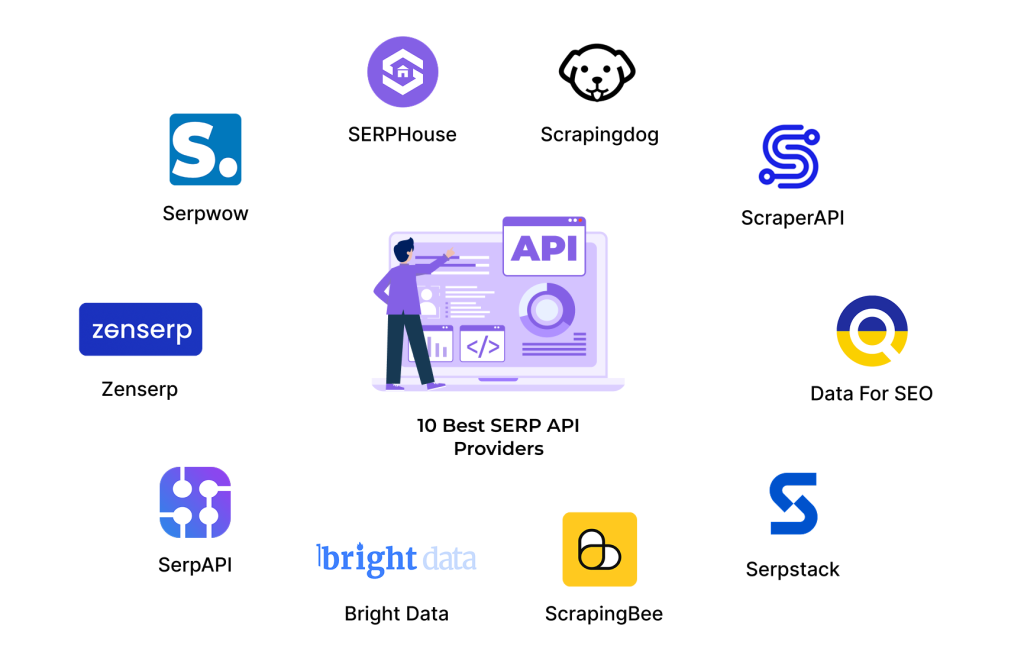
1. SERPHouse
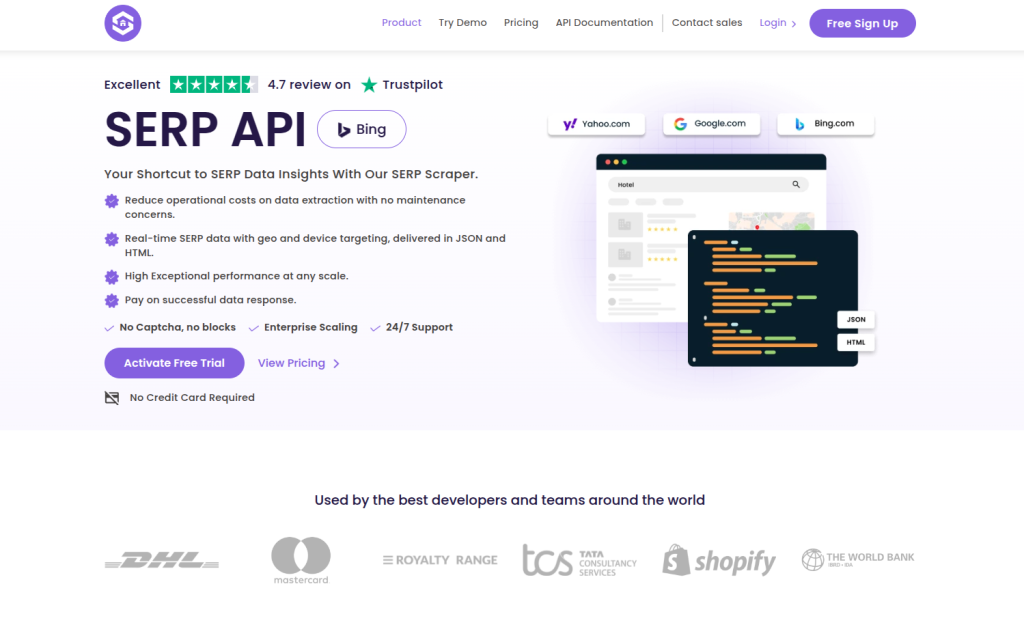
SERPHouse is a powerful but low-priced Best SERP API provider tool that lets businesses, marketers, and builders extract real-time search engine results from Google and other search engines. Whether you want to track keyword ranking, monitor SEO overall performance, or gather competitive intelligence, SERPHouse makes the method seamless by turning in smooth, structured, and accurate information via a simple API interface.
The SERPHouse stands out is its cost-effectiveness and flexibility. Compared to many expensive tools in the market, the SERPHouse offers reliable data extraction at significantly lower prices, making it ideal for startups, small businesses and budget limits.
Another key advantage of SERPHouse is its developer-centric design. The tool offers fast response times, detailed documentation, and multiple response formats (like JSON and HTML) to support easy integration into any tech stack. It also supports location-based and language-specific searches, enabling precise results tailored to different markets. With scalable plans and a user-friendly dashboard, SERPHouse offers a reliable and affordable solution for all SERP data needs.
Pros
- Cheapest SERP API tool compared to competitors
- Structured results from Google SERPs
- Supports organic results, ads, maps, snippets, and more
- Location and language targeting available
- A free trial is available to test the service
Cons
- Focused mainly on Google (limited search engine variety)
- Not ideal for JavaScript-heavy pages
2. Scrapingdog
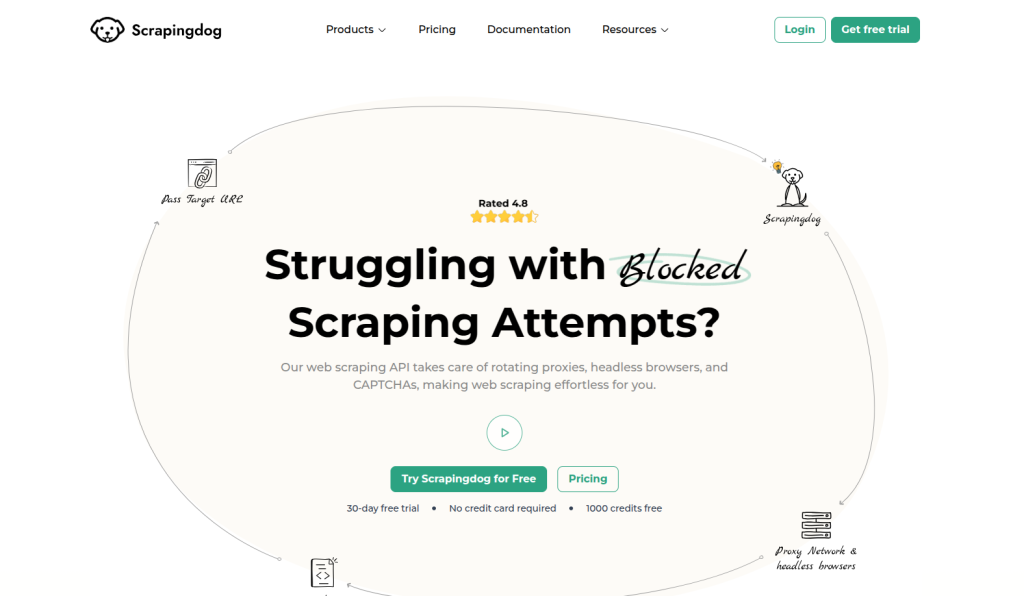
Scrapingdog is a modern and efficient Serp API provider designed to simplify the process of extracting data from search engines such as Google, Bing and Yahoo. This allows users to bypass CAPTCHA, IP ban and bot detection systems by providing a clean, ready-to-use API. With just a simple API call, the users can get accurate search engine results, making it a great option for SEO tracking, market analysis and competitive research.
What makes Scrapingdog stand out is its combination of ease of use, smart infrastructure, and affordable pricing. It takes care of all the backend complexity, such as rotating proxies, browser rendering, and handling JavaScript-heavy pages.
The tool is developer-friendly and supports both beginners and experienced coders. Its fast response times, real-time results, and various customization options make it suitable for businesses of all sizes. From keyword monitoring to extracting metadata, Scrapingdog delivers speed and stability in every request.
Pros
- Offers a dedicated SERP API with high accuracy
- Easy-to-integrate API with detailed documentation
- Competitive pricing plans
- Provides JSON output with structured search data
- Includes features for scraping Google Maps, images, and more
Cons
- Limited free requests in the trial plan
- Advanced features may require paid tiers
- No visual dashboard — API-only interface
3. ScraperAPI
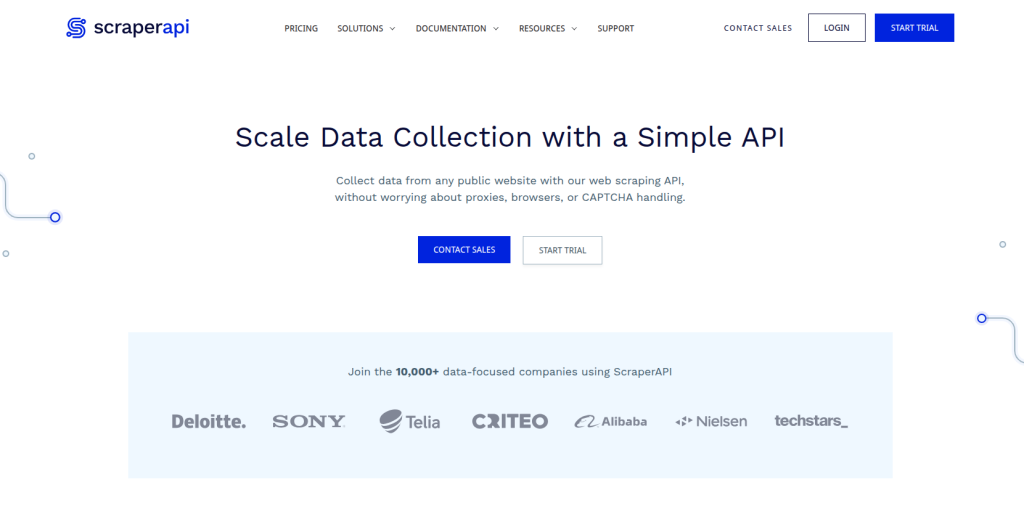
ScraperAPI is a popular SERP API provider tool that helps developers scrape search engine data without worrying about proxies, CAPTCHA or IP blocks. It is designed to automatically handle all common barriers of web scraping, such as geographical location targets, rotating proxies, user-agent headers and browser fingerprinting.
Focused on scalability and automation, this tool makes SERP scraping fast, flexible, and efficient. It is designed to handle millions of API requests every month with continuous performance, making it a tool for companies operating large-scale scraping projects. It supports various types of data extraction, including organic results, featured snippets, ads and local packs.
Additionally, ScraperAPI offers flexible usage with its RESTful API and detailed documentation. Users can select custom locations and device types to simulate different search environments. The platform also supports advanced configurations like JavaScript rendering, making it suitable for scraping dynamic content.
Pros
- Handles proxies, captchas, and blocks automatically
- Scalable for high-volume SERP data extraction
- Supports geotargeting and custom headers
- Good support for both small and large projects
Cons
- No free plan, only a limited free trial
- Requires some technical knowledge to set up
- Lacks a GUI dashboard (API-only platform)
4. Data For SEO
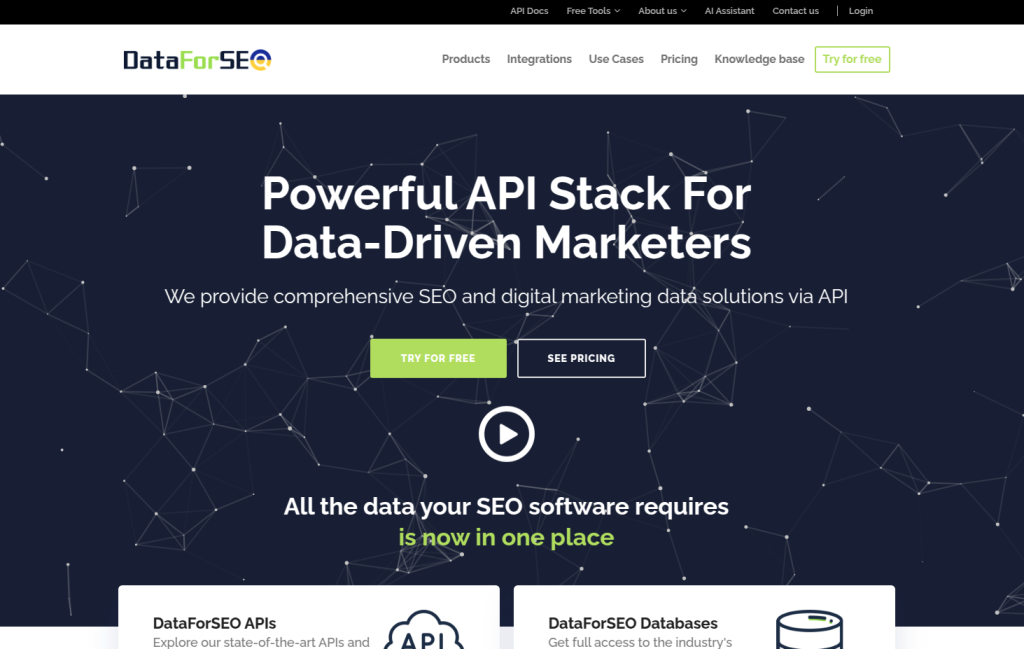
DataForSEO is a highly trusted and widely used SERP API provider that offers comprehensive SEO data solutions for businesses, agencies, and developers. It provides real-time and accurate search engine results from Google, Bing, Yahoo, and other major platforms. The tool supports various data types, including organic search results, paid ads, local packs, knowledge panels, and more — all accessible through simple API calls.
What sets DataForSEO apart is its depth of data and customisation. Users can fetch data by location, device, and language, making it perfect for geo-targeted SEO tracking and localised ranking insights. The platform also supports keyword research, SERP analysis, backlink data, and competitor monitoring, offering an all-in-one solution for SEO professionals.
Built to support everyone from startups to large enterprises, this powerful platform scales with your business needs. Flexible pricing based on usage allows users to only pay for what they need. The tool also provides extensive documentation, making integration simple for developers.
Pros
- Gives accurate SERP data
- Supports multiple data types: organic, ads, local, etc.
- Excellent for location-based and language-specific tracking
- Usage-based pricing – pay only for what you use
Cons
- No completely free tier (only pay-as-you-go)
- Can be complex for beginners or non-technical users
- Some APIs are more expensive compared to competitors
- Requires a proper request structure for each API call
5. Serpstack
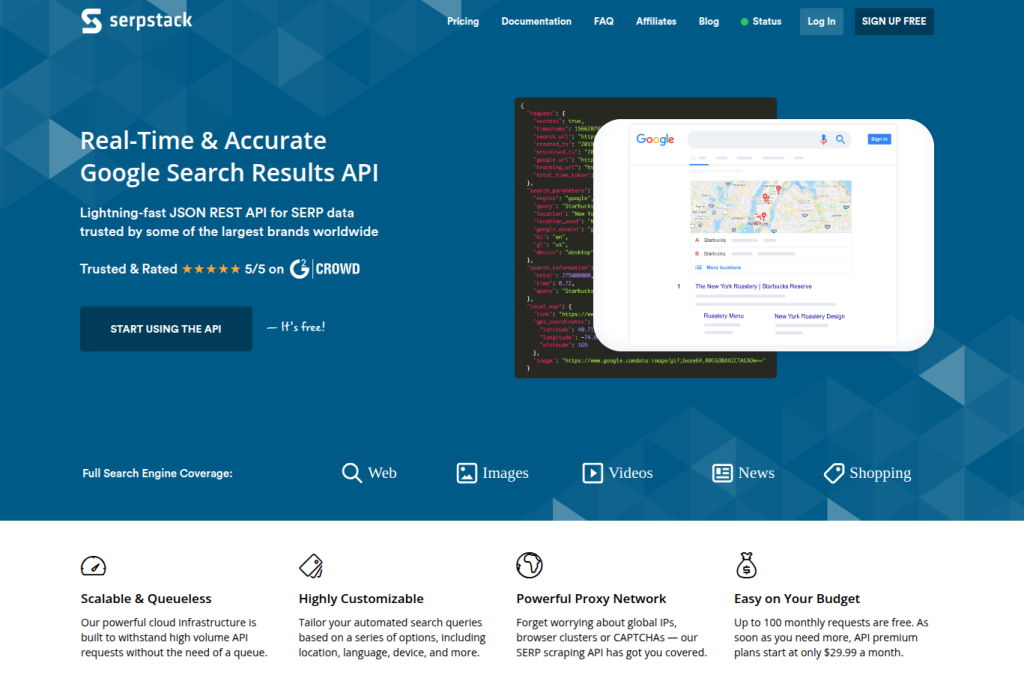
Serpstack is a powerful and user-friendly SERP API provider tool that allows developers and businesses to extract real-time search engine results from Google. It is built for performance and simplicity, and offers a scalable solution for anyone who wants to track keyword rankings, monitor the SEO performance or analyze competitor data directly from Google’s Serp.
One of Serpstack’s main strengths is its speed and infrastructure. It supports millions of API requests monthly and ensures fast, reliable responses with 100% uptime. With features like custom location targeting, device simulation, and rich result support (ads, featured snippets, maps, etc.), Serpstack helps users retrieve clean and structured SERP data effortlessly.
With a clean RESTful API and rich documentation, this tool is a go-to choice for developers seeking simplicity and speed. The platform also offers a free tier with limited monthly requests — great for testing or small projects.
Pros
- Offers real-time Google SERP data
- Fast performance with 99.9% uptime
- Supports location & device targeting
- Easy-to-use API with clear documentation
- Free plan available for testing
Cons
- Limited to Google SERPs only (no Bing, Yahoo)
- Some advanced features are locked behind paid plans
- The free tier has a low monthly limit
- Requires basic coding knowledge for integration
6. ScrapingBee
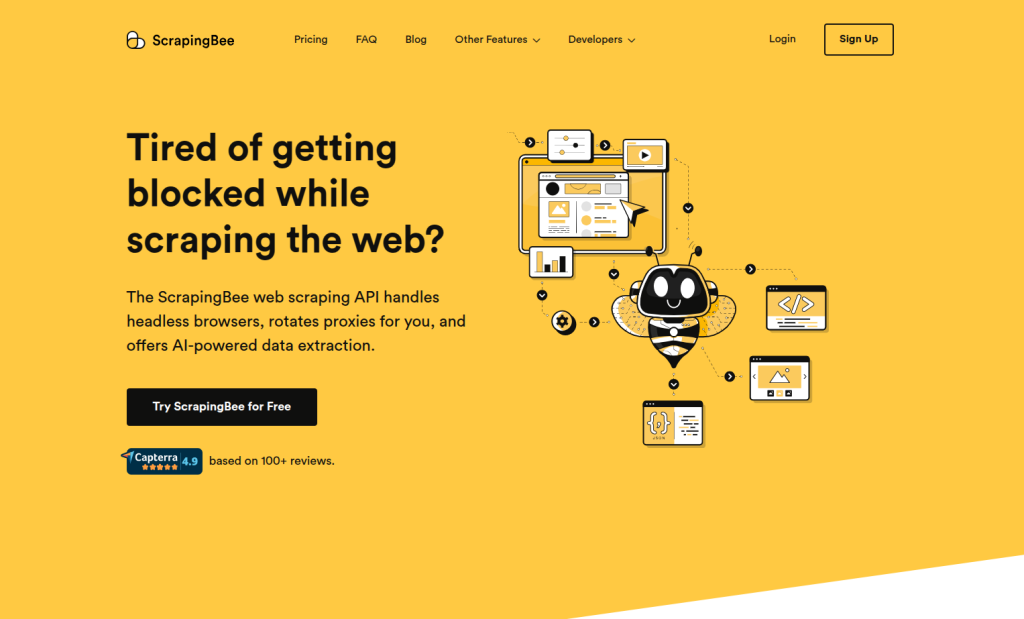
ScrapingBee is a strong and developer-friendly SERP API provider that allows users to easily search engine results from a Google-like platform. Designed to remove common scraping challenges such as IP restriction, CAPTCHA and browser detection, cares for ScrapingBee infrastructure so you can fully focus on collecting and using clean, structured SERP data.
Ideal for scraping dynamic content, this tool uses real browser sessions to handle JavaScript-heavy pages with ease. It helps organic results, featured snippets, ads, maps, and extra, assisting businesses in tracking keyword ranking, analysing search trends, and displaying competitors.
One of the major benefits of ScrapingBee is its simplicity. It provides a clean, comfortable API, supports many programming languages, and provides excellent documentation for smooth integration. Custom provides SEO tools and is ideal for large-scale data extraction. ScrapingBee offers unmatched reliability, flexibility and performance from lightning.
Pros
- Automatically bypasses CAPTCHAs and IP bans
- Supports Google SERP scraping with rich result extraction
- Allows geolocation and device targeting
- Scalable for both small and large data projects
Cons
- Primarily focused on Google (no wide engine support)
- No completely free tier – only limited trial credits
- Advanced use may require technical skills
- Costs can increase for high-volume usage or JavaScript rendering
7. Bright Data
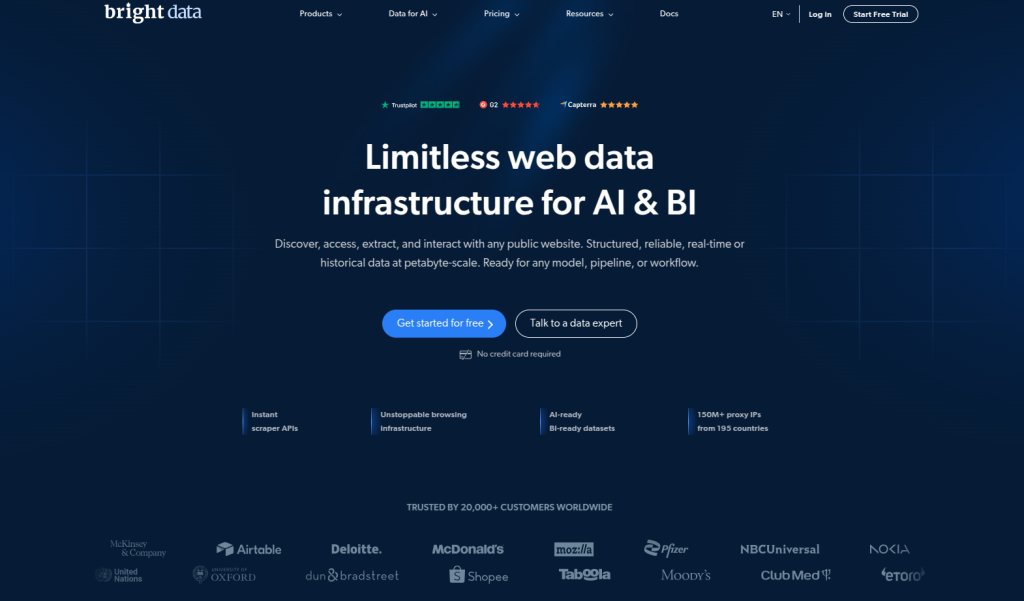
Bright Data (formerly known as Luminati) is a premium SERP API provider tool that offers enterprise-grade data extraction services for search engine results. It is widely recognized for its massive proxy infrastructure, global coverage, and high-level customization.
Known for unmatched scalability and control, this platform is built to handle large-scale data extraction with precision. It supports large-scale scraping operations and allows users to configure advanced parameters like location, language, browser type, and mobile/desktop view. The API handles all challenges such as CAPTCHA solving, IP rotation, and bot detection.
Though it’s built for enterprises, Bright Data also provides detailed documentation, SDKs, and no-code tools to support a wide range of users. Whether you’re a developer building a SaaS platform or an agency running competitor analysis, Bright Data delivers rich and structured search data at scale — backed by one of the most reliable infrastructures in the data extraction industry.
Pros
- Structured search engine results
- Automatically bypasses CAPTCHAs, blocks, and IP bans
- Provides browser-based rendering and JavaScript support
- Excellent documentation, SDKs, and customer support
- Highly scalable for large enterprises and high-volume tasks
Cons
- High pricing – more suitable for enterprise-level budgets
- Might be overkill for small businesses or simple scraping tasks
- Requires technical understanding for full configuration
- No free tier – only a short trial or demo is available
8. SerpAPI
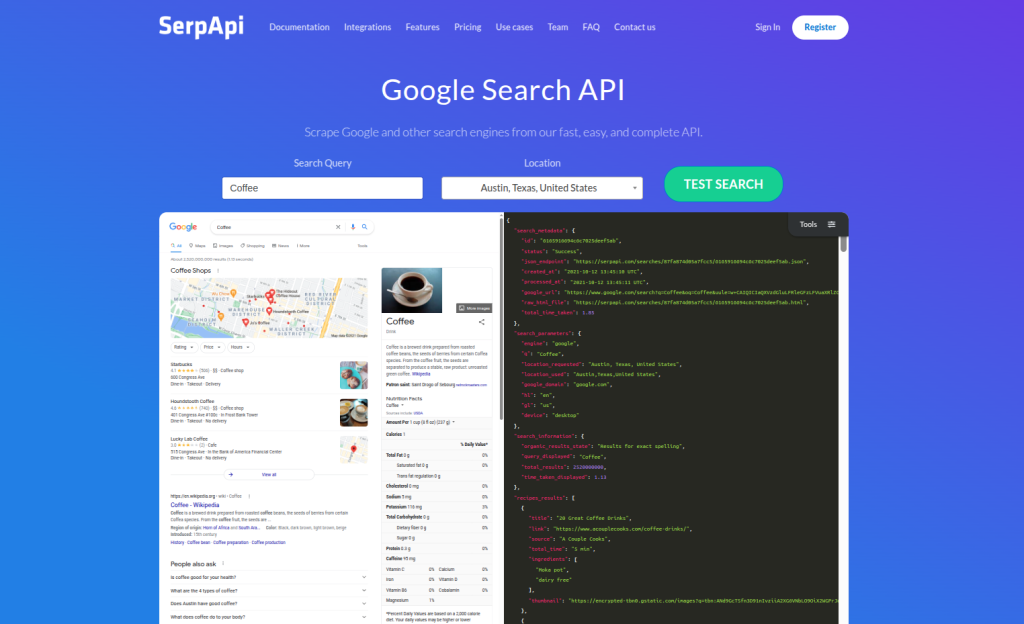
SerpAPI is one of the most widely used and feature-rich SERP API provider tools in the market. It enables developers and businesses to access structured search engine data from platforms like Google, Bing, Yahoo, Baidu, and more through a single, unified API.
What makes SerpAPI stand out is its breadth of search data coverage. From organic results and paid ads to featured snippets, Google Maps, Shopping results, news, videos, and images — SerpAPI captures it all. It supports real-time geotargeting, language selection, device-specific results, and more.
Another key benefit is the developer-first approach. SerpAPI provides interactive documentation, official client libraries in multiple languages, and a user-friendly dashboard for managing queries. It also includes a playground for testing live requests before deployment.
Pros
- Extracts detailed SERP elements: organic, ads, maps, snippets, videos, etc.
- Delivers geolocation and device targeting
- Scalable for high-volume tasks
- Trusted by both startups and enterprises
Cons
- Premium pricing – can be expensive for small users
- No completely free tier, only limited trial credits
- May offer more data than needed for basic use cases
- Slight learning curve for full feature utilization
9. Zenserp
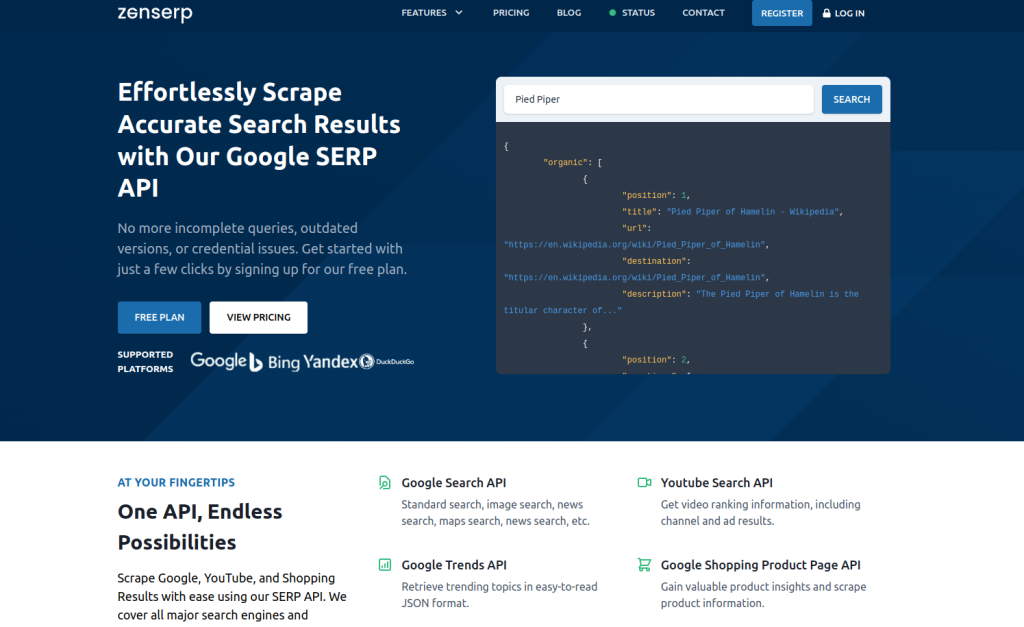
Zenserp is a fast and reliable SERP API provider tool designed to extract structured search engine data from platforms like Google, Bing, and DuckDuckGo. It is built to simplify the process of collecting SERP data by handling all the technical barriers such as IP blocks, CAPTCHA solving, and proxy rotation automatically.
Offering precise, location-based results across search types like organic, ads, images, videos, shopping, and news, this tool ensures complete SERP coverage. The tool is ideal for SEO tracking, competitor analysis, market research, and content strategy.
What makes Zenserp popular is its developer-friendly interface and fair pricing. It offers free and paid plans, allowing users to test and scale as they grow. With well-documented APIs, clear rate limits, and a simple integration process, Zenserp is suitable for small startups, SEO agencies, and large enterprises alike.
Pros
- Real-time Google and Bing SERP data
- Supports organic, images, videos, ads, news, and shopping results
- Gives a free plan with limited use
- Scalable for small to large data needs
Cons
- Limited to a few search engines (no Baidu or Yandex)
- The free tier has a low monthly request limit
- No built-in dashboard for deep analytics
10. Serpwow
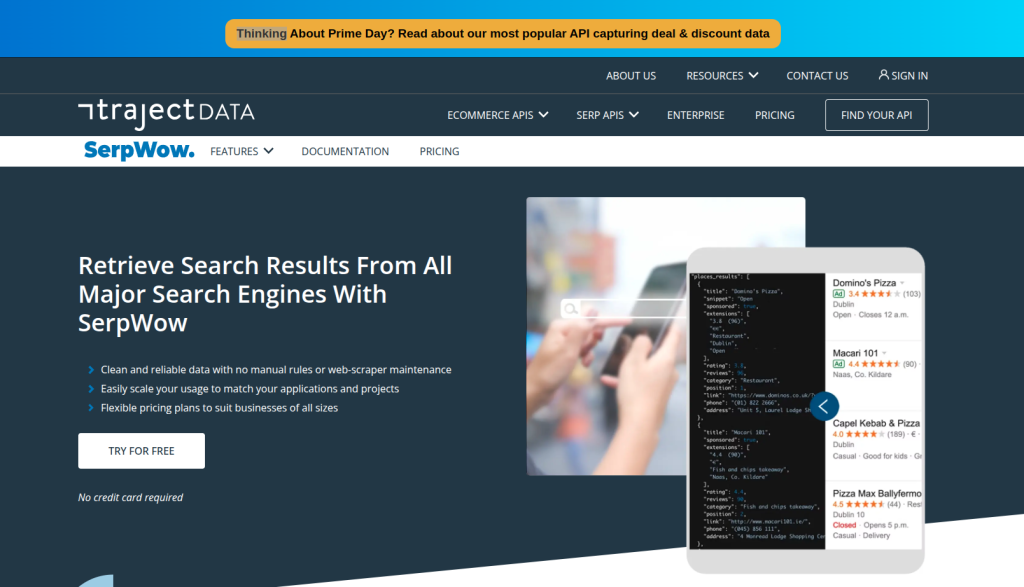
Serpwow is a reliable and user-friendly SERP API provider service that returns real-time Google search results in structured JSON format. It enables businesses, marketers, and developers to extract organic results, sponsored advertisements, featured snippets, local packs, videos, images, and more directly from Google’s search engine.
One of Serpwow’s most significant features is its global search support. Users can simulate Google searches from any country, language, or device. Serpwow provides location- and device-specific results with a high success rate, whether you’re conducting foreign SEO research, tracking brand visibility, or analysing competitors.
Serpwow is also noted for its developer-friendliness. It provides detailed documentation, code examples in various programming languages, and simple use dashboards for tracking API utilisation. It offers flexible price models, including a free trial, making it ideal for startups, single developers, agencies, and businesses alike.
Pros
- Real-time Google SERP data in structured JSON
- Provides worldwide location and device targeting.
- Clean, easy-to-use API with great documentation
- Multiple SDKs and code samples for faster integration
Cons
- Limited to Google only (no Bing, Yahoo, or other engines)
- No completely free tier, only a temporary free trial
- May not be ideal for high-frequency, large-scale scraping unless on premium plans
Conclusion
With SEO changing faster than ever, having the right SERP API by your side can make or break your strategy. Some tools on this list offer unbeatable speed, others shine with advanced features, and a few — like SERPHouse — offer real value at a fraction of the price.
No matter your goals, working with one of the best SERP API providers will give you the data edge you need to stay ahead. You’ve now got the top 10 in front of you — it’s just a matter of choosing the one that fits your workflow best.
